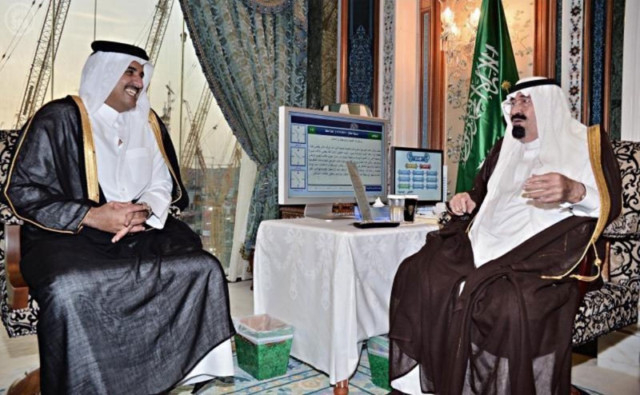
Beirut: In a March 6, 2014 opinion essay, the historian Madawi Al Rasheed wondered whether “for Qatar, perhaps Saudi Arabia rather than Iran or the Muslim Brotherhood [was now] the real threat.”
This devastating assessment highlighted intrinsic tensions within the Gulf Cooperation Council (GCC), with pernicious evaluations that the Council would fragment before long. Allegedly, the smaller Arab Gulf states and Oman rejected Saudi hegemony, even if Qatar presumably shared with the kingdom, the Unitarian (Wahhabi) creed of the faith.
Notwithstanding historical tensions that go back decades, authorities in Doha worked hard to redefine Wahhabi norms, away from what they perceived to be its inward-looking incarnation in Saudi Arabia. Still, by aligning itself with the Muslim Brotherhood and hosting a slew of Islamist dissidents and activists, the Al Thani ruling family disassociated itself with the carefully nurtured GCC alliance whose primary aim was to ensure the “stability and security” of each individual member-state.
Moreover, and inasmuch as Doha’s ties with the Muslim Brotherhood was a long-standing affair, one wondered what was left of the GCC alliance’s political mantra when Riyadh unravelled the kingdom’s support to the government of Egyptian president Mohammad Mursi before it was toppled in July 2013 and, equally important, when the two neighbouring states disagreed on how best to assist revolutionary forces opposed to the embattled Syrian leader Bashar Al Assad.
In the event, neither of these developments was as consequential as assertions that Qatar facilitated Iranian activities throughout the Arabian Peninsula and, even worse, became a platform for Saudi Islamists.
Ironically, relations between Qatar and Saudi Arabia improved after the 1995 coup d’état that brought to power the previous ruler, Shaikh Hamad Bin Khalifa Al Thani, which occurred less than five years after the 1991 US-led UN-approved attack to expel Iraqi forces from Kuwait. At the time, Riyadh accepted the US Israeli withdrawal from occupied territories of its military assets to the kingdom, and chose to quickly overlook the deposed Shaikh Khalifa Bin Hamad’s attempts to organise a counter-coup against his young son. In the midst of an economic boom, Qatar developed its North Dome Gas field, which it shared with Iran, and maintained relations with Iran during Mahmoud Ahmadinejad’s presidency.
Qatar was beholden to US military protection, as it developed what Mehran Kamrava, the Director of the Centre for International and Regional Studies at Georgetown University’s School of Foreign Service in Qatar, coined as the “subtle” power of a small state. Doha used its substantial financial might, along with the incredible Al Jazeera asset, to further secure this “subtle power” even if GCC disagreements remained intact.
The most serious disputes between the two countries arose in 2003 and 2006, when Saudi Arabia objected to a multibillion dollar Qatari project to supply gas to Kuwait as well as to the UAE-Qatari Dolphin Undersea Natural Gas Pipeline project, respectively. In both instances, Saudi power proved effective and though Riyadh denied that it withheld its approvals, Qatari authorities awaited a green light before any progress could be recorded on either scheme.
An equally problematic controversy was Shaikha Mouzah Bint Nasser’s lawsuit against the Saudi-owned Al Sharq Al Awsat newspaper for falsely reporting that the Qatari ruler, her husband, had secretly visited Israel.
Although she won the 2005 libel case in a British Court, her petition charged that the paper was “controlled by Saudi intelligence paymasters who used the newspaper as a mouthpiece for a propaganda campaign against Qatar and its leadership.”
In the event, Shaikha Mouzah visited King Abdullah Bin Abdul Aziz in Riyadh, as a full-fledged reconciliation was recorded. Still, such episodes added to existing suspicions, which fuelled lingering disagreements.
To be sure, Qatari initiatives placed the country at loggerheads with Saudi Arabia, although the decision to embrace the Muslim Brotherhood stood in direct contradiction of its “subtle-power-diplomacy.” It remained to be determined how Shaikh Tamim Bin Hamad Al Thani intended to advance Qatari interests — to preserve and protect the monarchy — without the strategic support of its GCC partners.











